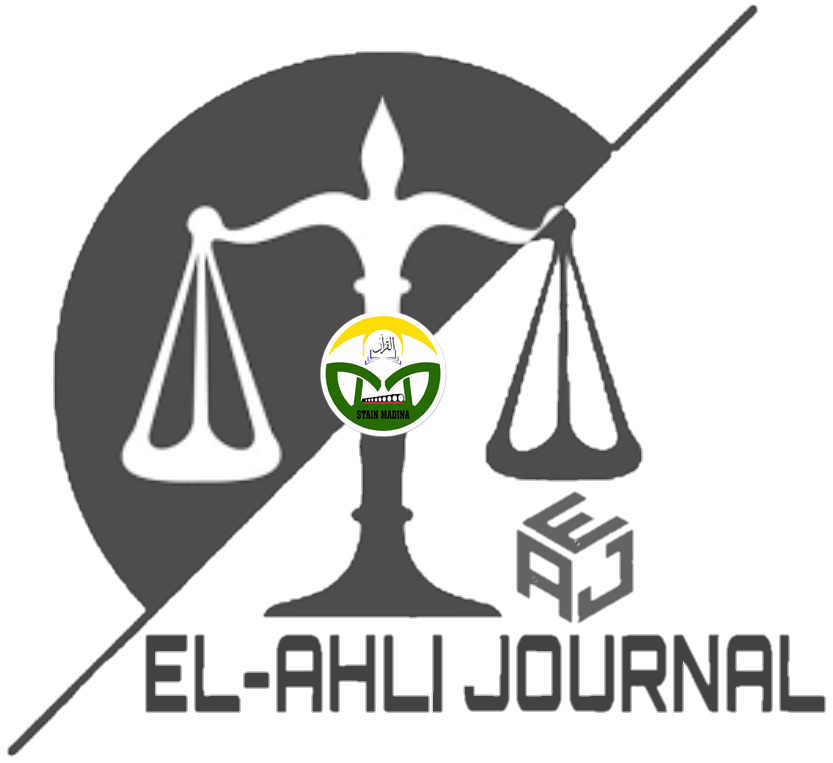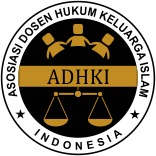RELEVANSI HUKUM ISLAM TERHADAP NILAI-NILAI ADAT MASYARAKAT SIDOJADI DALAM PEMBAGIAN WARISAN
DOI:
https://doi.org/10.56874/el-ahli.v4i2.1679Keywords:
Customary Inheritance, Islamic Law, SidojadiAbstract
This research explores traditional values in the traditional inheritance distribution system carried out by the Sidojadi community in Mandailing Natal Regency from the perspective of Islamic law. So, the research aims to understand how local customary values and traditions coexist with various principles contained in Islamic law regarding the inheritance distribution process. The data found were analyzed using the descriptive-analytical method, namely analyzing primary and secondary data obtained through interviews and literature studies and trying to see the relationship between the two. The results of the research explain that the relationship between the customary inheritance system and the principles of Islamic law which is reflected in the arrangements for the distribution of inheritance in the Sidojadi community, starting from the appointment of heirs, as well as the involvement of traditional institutions in this process has illustrated a very positive thing. Apart from that, the research results also explain that the harmony between traditional values and principles in Islamic law related to the context of inheritance distribution in Sidojadi society is very appropriate.
References
’Azam, Abdul ’Aziz Muhammad. Al-Qowa’id Al-Fiqhiyah. Kairo: Dar El Hadith, 2005.
Ar-Rozi, Syekh Imam Muhammad ibn Abu Bakar ibn Abdul Qodir. Mukhtarus Shohhah. Kairo: Dar El Hadith, 2003.
Basyir, Ahmad Azhar. Hukum Adat Bagi Umat Islam. Yogyakarta: Perpustakaan Fakultas Hukum Universitas Islam Indonesia, 1990.
Dwi Wulandari. “Bagian Waris Bagi Janda Dalam Hukum Kewarisan Islam Dan Kompilasi Hukum Islam.” Nizham 8, no. 01 (2020): 73–81.
Firdaweri. “Konsep Ahli Waris Menurut Islam Dan Adat.” Asas 7, no. 2 (2015): 1–21.
Hadikusuma, Hilman. Hukum Waris Adat. Bandung: Citra Aditya Bakti, 2003.
Julian Harrisal Djauhary , H. KN. Sofyan Hasan, H. Achmad Syarifudin. “Pembagian Harta Waris Menurut Hukum Adat Dan Hukum Islam Di Kecamatan Cempaka Kabupaten Oku Timur.” Repertorium: Jurnal Ilmiah Hukum Kenotariatan 5, no. 2 (2016): 42–60. www.notariat.fh.unsri.ac.id.
Khallaf, Abdul Wahab. Ilmu Ushul Al Fiqh. Kairo: Dar El Hadith, 2002.
M. Quraish Shihab. Wawasan Al-Qur’an Tafsir Tematik Atas Pelbagai Persoalan Umat. Wawasan Al-Qur’an Tafsir Maudhu’I Atas Pelbagai Persoalan Umat. Bandung: Mizan, 2007.
Naskur. “ASAS-ASAS HUKUM KEWARISAN DALAM ISLAM (Studi Analisis Pendekatan Al-Qur’an Dan Al-Hadis Sebagai Sumber Hukum Islam) Naskur,” 2005.
Nasution, Martua. “Hasil Penelitian.” Sidojadi, 2023.
Nasution, Martua, and Raja Ritonga. “The Concept of Mani ’ and Its Application in Islamic Inheritance.” JRSC: Journal of Religious, Social and CulturalJournal 01, no. 2 (2023): 1–14.
Prayoga, M. Guntur Ageng. “Kalalah Menurut Imam Syafi’i Dan Hazairin Serta Implikasinya Terhadap Hukum Kewarisan Islam Di Indonesia.” Program Pasca Sarjana Institut Agama Islam Negeri Metro Lampung, 2018.
Raja Ritonga, Martua Nasution. “Sistem Waris Masyarakat Muslim Batak Angkola Dalam Tinjauan Alqur ’ an ( Studi Komparasi Surah An-Nisa Ayat 11, 12 Dan 176 ).” Asy-Syari`ah: Jurnal Hukum Islam 7, no. 2 (2021): 209–33. https://doi.org/10.36835/assyariah.v7i2.544.
———. “Teori Penentuan Bagian Ahli Waris Ashabul Furudh.” Teraju: Jurnal Syariah Dan Hukum 4, no. 01 (2022): 15–25.
Ritonga, Raja. “Hak Waris Janin Dan Metode Hitungan Bagiannya Dalam Waris Islam; Analisis Dan Aplikatif.” Mizan: Journal of Islamic Law 5, no. 1 (2021): 29–42. https://doi.org/10.32507/mizan.v5i1.900.
———. “Sistem Kewarisan Adat Masyarakat Muslim Suku Tengger Perspektif Hukum Islam.” El Ahli: Jurnal Hukum Keluarga Islam 1, no. 1 (2020): 1–19.
———. “Telaah Kritis Konsep Radd Dalam Waris Islam Menurut ‘Aly Al-Sabuny.” Al-Qanun: Jurnal Pemikiran Dan Pembaharuan Hukum Islam 25, no. 1 (2022): 29–42.
———. “The Concepts and Methods of Dzawil Arham Heritage Calculation: Analysis and Practice.” Nurani: Jurnal Kajian Syari’ah Dan Masyarakat 21, no. 2 (2021): 159–74. https://doi.org/10.19109/nurani.v21i2.8687.
———. “The Firts Class of Women Heir Member in The Observation of Surah An-Nisa Ayat 11, 12 and 176.” Al- ‘ A Dalah : Jurnal Syariah Dan Hukum Islam 6, no. 1 (2021): 1–17. https://doi.org/10.31538/adlh.v6i1.1362.
Ritonga, Raja, and Amhar Maulana Harahap. “Dinamisasi Kewarisan Islam Pada Kasus Musytarikah Dalam Konsep Syajarotul Mirats.” Al-Ahwal Al-Syakhsiyyah: Jurnal Hukum Keluarga Dan Peradilan Islam 3, no. 1 (2022): 1–17. https://doi.org/10.15575/as.v3i1.17248.
Ritonga, Raja, and Liantha Adam Nasution. “Metode Hitungan Waris Islam Pada Kasus Munasakhat Korban Pandemi Covid-19 Dan Bencana Alam.” El-Ahli : Jurnal Hukum Keluarga Islam 2, no. 2 (2022): 73–93. https://doi.org/10.56874/el-ahli.v2i2.639.
Sa’adah, Sri Lum’atus. “Maqashid Al-Syari’ah Dalam Hukum Kewarisan Islam.” Al-Ahwal 7, no. 1 (2015): 125–46.
Shobuni, Syekh Muhammad Ali. Al Mawarits Fi Asy-Syari’ah Al- Islamiyah Fi Dhoui Al Kitab Wa As Sunnah. Kairo: Daar Ash Shobuni, 2002.
Sihati, Alfi, N. A Rohmah, Siti Masturoh, and Mardaty Rauv. “Kebhinekaan Dan Keberagaman.” Jurnal Inovasi Penelitian 2, no. 9 (2022): 2953. file:///C:/Users/user/Downloads/1169-Article Text-3231-1-10-20220131.pdf.
Sopiansyah, Deni, Nurwadjah Ahmad EQ, and Andewi Suhartini. “Kehidupan Dunia Dan Akhirat Dalam Perspektif Pendidikan Islam.” As-Syar’i: Jurnal Bimbingan & Konseling Keluarga 3, no. 2 (2021): 134–49. https://doi.org/10.47467/assyari.v3i2.463.
Sopyan, Yayan, and Isnawati Rais. “Degradation of Customary Inheritance Law in The Sai Batin Lampung Tribe” 17, no. 2 (2020): 295–316.
Sumper Mulia Harahap, Martua Nasution, Raja Ritonga. “Konsep Dan Metode Penyelesaian Kewarisan Antara Kakek Dengan Saudara Menurut Syekh Ali Ash Shobuni.” Istinbáth 21, no. 1 (2022): 57–86.
Supriyadi. “Pilihan Hukum Kewarisan Dalam Masyarakat Pluralistik (Studi Komparasi Hukum Islam Dan Hukum Perdata).” Al-´Adalah 12, no. 3 (2015): 553–68.
Downloads
Published
How to Cite
Issue
Section
License
All articles published in EL-AHLI: Jurnal Hukum Keluarga Islam are licensed under a Creative Commons Attribution-ShareAlike 4.0 International License (CC BY-SA 4.0).
Under this license, authors and readers are free to:
-
Share — copy and redistribute the material in any medium or format.
-
Adapt — remix, transform, and build upon the material for any purpose, even commercially.
Under the following terms:
-
Attribution — You must give appropriate credit, provide a link to the license, and indicate if changes were made. You may do so in any reasonable manner but not in any way that suggests the licensor endorses you or your use.
-
ShareAlike — If you remix, transform, or build upon the material, you must distribute your contributions under the same license as the original.
Copyright and Licensing Policy:
-
The author retains copyright and grants the journal the right of first publication with the work simultaneously licensed under the Creative Commons Attribution-ShareAlike 4.0 International License, which allows others to share the work with acknowledgment of the work’s authorship and initial publication in this journal.
-
Authors are allowed to enter into separate, additional contractual arrangements for the non-exclusive distribution of the journal's published version of the work (e.g., post it to an institutional repository or publish it in a book), with an acknowledgment of its initial publication in this journal.
Link to License:
https://creativecommons.org/licenses/by-sa/4.0/





